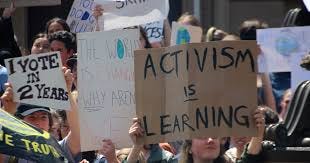What's Wrong with Being a "Revolutionary"? Nothing. In fact, it's necessary.
I was recently asked a question that made me pause and double down.
My favorite part of presenting to non-academic audiences is Q and A. Giving prepared remarks is fine, but nothing captures the excitement of being forced to think on your feet from smart questions. Often, this is where the most truthful and blunt responses come out.
Such was the case a week ago, when I gave a virtual presentation at an education-tech company, one of the largest US-based providers of teaching and learning materials for schools, K through college. The company was interested in supporting student and staff agency and invited me to help describe how.
Over the last couple of years, my presentation style has shifted. I no longer only suggest that we support student agency; I describe it as critical. I call on people to do what they can — to use their personal spheres of influence — to create more equitable systems for everyone.
Achievement is not an individualistic pursuit as we have been sold to believe; rather it is a collective one.
The quicker we realize this and act accordingly, the better we can address societal ills from climate change to mass incarceration. We can create a safety net for all, uniting over our differences instead of fighting over them.
So last week, after my lecture and during the Q and A, a woman asked this question, verbatim:
“Dr. Kundu, it seems as if you're just a breath away from advocating for agency giving way to activism, that is [people] and their learning communities not only taking control of the content but the context of their education. What does this look like to you, mindful that an “activist” does not necessarily equal a “revolutionary”?
“What’s wrong with being a revolutionary?” I found myself asking back. “Maybe that’s a valid goal we should set for our students and for ourselves. After all, the world they are growing up in is anything but justified in its current condition. We need change to get out of our predicaments and move towards progress.”
I meant every word. I realized that I truly believe that agency and activism are on two sides of the same coin.
We have no time to be passive.
The purpose of education is not to acquiesce to our surroundings, but liberate us from the oppressive forces holding us down and keeping us divided.
Being beholden to a nonsensical, two-party system, one which polarizes us on each issue is oppressive. Paying outrageous healthcare costs which we don’t even understand due to lack of transparency is oppressive. Rampant income inequality, while those at the top never pay a fair share of taxes is oppressive. And a tax system which funds wars the majority of Americans do not support is oppressive.
The biggest problem with the status quo is that it is specifically engineered to convince us we are powerless against it. That is by design. For us to create stronger and fairer systems for all, we have to actively unlearn much of what we know. Then we can relearn how to create opportunities of possibility for ourselves and others. We have to have an active and hopeful imagination.
We have to have hope, but we have to know what we are up against.
We have to be activists. And yes, that means sometimes even revolutionaries.
Anindya Kundu is an assistant professor of Educational Leadership and the author of The Power of Student Agency (2020). He is completing his second book, The Power of Educational Leadership (Oxford University Press, 2025). Follow Anindya on Twitter or LinkedIn.





I love this prof